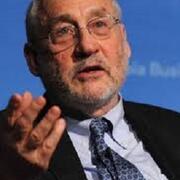
Author: Doug Gavel
Nobel Prize winning economist Joseph Stiglitz, University Professor at Columbia University, shared his thoughts on carbon pricing, the post-pandemic economic recovery, and green economy transition during a virtual forum Tuesday (September 8) sponsored by the Harvard Project on Climate Agreements (HPCA), and hosted by Robert Stavins, A.J. Meyer Professor of Energy and Economic Development at Harvard Kennedy School. This series, HPCA Conversations on Climate Change and Energy Policy, features leading authorities on climate change policy, whether from academia, the private sector, NGOs, or government.

The discussion with Stiglitz focused on a range of policy issues, including the plusses and minuses of international climate change efforts, fossil fuel divestment, and long-term risk planning and assessment.
In regards to the international Paris Agreement reached in 2016, Stiglitz remarked that it “didn’t go far enough,” because of political constraints.
“The voluntary commitments don’t add up to meet the goals that were set,” Stiglitz argued. The commitments are voluntary, he explained, because the United States would not have supported a mandatory design. “It was America’s foot dragging that was the source of the limitations of that approach.”
Stiglitz argued that he favors a multi-faceted strategy to address climate change and to spur the transition to a green economy – including public investments, research and development, regulations, and carbon pricing. Such a “carbon package,” he said, can serve as a long-term economic stimulus because it will encourage companies to retrofit their operations, thereby spurring private investment and innovation. “And that’s the sense in which it will be a growth story,” he explained. “It will actually make for a more dynamic economy.”
The economic impacts of COVID-19 may have temporarily diverted resources away from the climate change effort, Stiglitz remarked, but the post-pandemic period will bring tremendous opportunities to integrate green policies into economic recovery plans in the United States and elsewhere.
“The pandemic has brought to light some of the real weaknesses in our economy. It has certainly made us more aware that we need to be better prepared for the risks that we face. One of those risks was the pandemic that we hadn’t thought about, and the other one is something we know about, which is climate risk,” he said.
Discussing public investments moving forward, Stiglitz remarked, “From my perspective, we as citizens have the right to make sure that that money serves a dual purpose – not only the purpose of bringing the economy back, [but] back in a way that is more consistent with the vision that we want of the post-pandemic economy and society. And that means a more equal society, I hope, a more knowledge-based society, and a much greener economy.”
Stiglitz highlighted two examples of national recovery plans that include green elements – in France where the airline rescue package includes provisions that airlines reduce their carbon footprint; and in New Zealand, where unemployed and underemployed citizens were hired to improve public parks, which serve as popular tourist destinations.
Stiglitz cited the European Union’s “Green Deal” as an example of a multi-lateral effort to hasten the transition to a green economy, and he likened it to a wartime effort to address a very visceral threat.
“What we are talking about here is heavy mobilization of resources,” he said. “Sometimes I use the metaphor of a Green New Deal wartime mobilization. The difference is that you see your enemy right in front of you in war. The effects of climate change, we are seeing right in front of us – in the fires, the hurricanes, the floods, but some people are not seeing it as clearly as we would see a military attack.”
Stavins posed several questions to Stiglitz that were submitted by members of the virtual audience, on issues ranging from the challenges facing developing countries to the economic capacity necessary to move the needle on climate change.
When asked what approach he would advocate to achieve widespread policy support for achieving net CO2 emissions reductions by the year 2040, Stiglitz remarked that, “I think that as a recognition that we all share the planet and carbon molecules don’t carry passports, that we’re in this together. There is a shared concern. Hopefully that will be enough to enable people to come to agreement on what a fair sharing of the burden is.”
Stiglitz explained that there is plenty that individuals can do to help in the fight against climate change.
“We all have multiple roles in our society. We are consumers. We are workers. We are citizens. As citizens, we have an important role in advocacy, in helping change the political process to help deal with carbon and the green transition. The only way these problems will be solved is when we have proper public policy,” he said.
“As consumers, I think we also have roles, moving more towards greener housing, greener eating, greener transportation. We make lots of decisions,” he continued. “As individuals, we do savings, and we could put our money into portfolios that are greener. We can express our values through how we allocate our portfolios.”
“As workers, I think it’s important to articulate to the extent that we can, and in some firms there’s a greater openness than others, that we ought to be thinking of moving towards greener. I would argue it’s better for the companies…if they’re ready for the green transition,” he stated. “I think there are lots of individual actions, and if we’re going to move our society, it will take lots of these adding up together to succeed in doing this.”
The next HPCA Conversation on Climate Change and Energy Policy is scheduled for October 19 with guest Joseph Aldy, Professor of the Practice of Public Policy at Harvard Kennedy School. Please register in advance for this event on the HPCA website.
| stiglitz_transcript.pdf | 245 KB |
